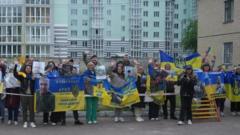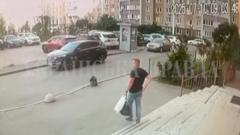The impending swap, involving 1,000 prisoners from each side, marks a notable development amidst ongoing tensions and lackluster peace talks.
Major Ukraine-Russia Prisoner Swap on the Horizon, Details Still Emerging

Major Ukraine-Russia Prisoner Swap on the Horizon, Details Still Emerging
A significant prisoner exchange between Ukraine and Russia is anticipated, though precise details remain elusive.
In a pivotal announcement, Ukraine and Russia are reportedly preparing for their largest prisoner swap since the beginning of the full-scale invasion in 2022. The agreement, reached during inconclusive peace negotiations in Istanbul last week, entails the exchange of 1,000 prisoners of war from both nations.
While US President Donald Trump celebrated the news on his Truth Social platform, asserting that the swap might herald significant developments, neither Ukraine nor Russia has confirmed the operational specifics as of yet. Ukrainian military sources merely indicated that the process is ongoing. Unverified reports suggest the exchange could unfold over three days at the border linking Ukraine and Belarus.
This agreement arose from a rare face-to-face meeting between low-level representatives from both countries, the first since March 2022, which lasted just two hours and ultimately resulted in no substantive progress toward a ceasefire. Russian Foreign Minister Sergei Lavrov mentioned a second round of discussions, where Moscow is expected to submit a "memorandum" to Ukrainian officials.
Trump previously stated that negotiations for a ceasefire could commence "immediately," following a brief phone call with Russian President Vladimir Putin. In contrast, Ukrainian President Volodymyr Zelensky accused Putin of merely attempting to stall the war.
Meanwhile, Italian Prime Minister Giorgia Meloni has expressed her support for Trump's proposal suggesting the Vatican could play a mediating role in peace talks. However, Lavrov downplayed this suggestion as "not very realistic." He reiterated an unfounded assertion that Zelensky lacks legitimate leadership and proposed that new elections might be necessary before any peace agreement could be solidified.
In response to inquiries about Russia's openness to signing a deal, Lavrov stated, "First we need to have a deal," signaling that discussions are still in preliminary stages. He emphasized the importance of crafting a reliable peace agreement that secures long-term stability and safety for Russia and its concerns. The ongoing situation remains fluid, with the potential for further developments in both the prisoner exchange and peace negotiations.
While US President Donald Trump celebrated the news on his Truth Social platform, asserting that the swap might herald significant developments, neither Ukraine nor Russia has confirmed the operational specifics as of yet. Ukrainian military sources merely indicated that the process is ongoing. Unverified reports suggest the exchange could unfold over three days at the border linking Ukraine and Belarus.
This agreement arose from a rare face-to-face meeting between low-level representatives from both countries, the first since March 2022, which lasted just two hours and ultimately resulted in no substantive progress toward a ceasefire. Russian Foreign Minister Sergei Lavrov mentioned a second round of discussions, where Moscow is expected to submit a "memorandum" to Ukrainian officials.
Trump previously stated that negotiations for a ceasefire could commence "immediately," following a brief phone call with Russian President Vladimir Putin. In contrast, Ukrainian President Volodymyr Zelensky accused Putin of merely attempting to stall the war.
Meanwhile, Italian Prime Minister Giorgia Meloni has expressed her support for Trump's proposal suggesting the Vatican could play a mediating role in peace talks. However, Lavrov downplayed this suggestion as "not very realistic." He reiterated an unfounded assertion that Zelensky lacks legitimate leadership and proposed that new elections might be necessary before any peace agreement could be solidified.
In response to inquiries about Russia's openness to signing a deal, Lavrov stated, "First we need to have a deal," signaling that discussions are still in preliminary stages. He emphasized the importance of crafting a reliable peace agreement that secures long-term stability and safety for Russia and its concerns. The ongoing situation remains fluid, with the potential for further developments in both the prisoner exchange and peace negotiations.



















